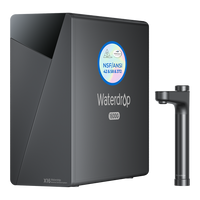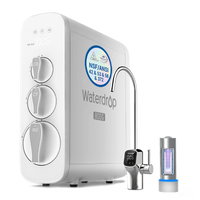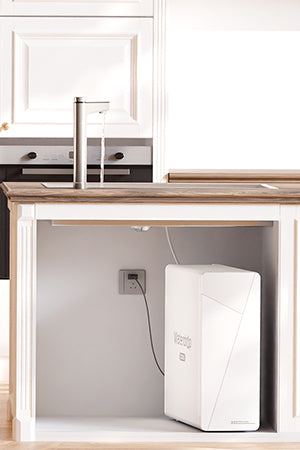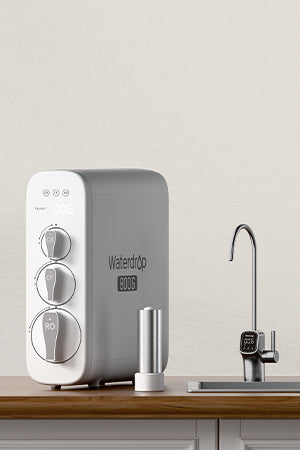Among the most common health challenges in Canada is blood sugar control. Whether you are prediabetic, diabetic, or simply someone who needs reliable levels of energy, you may have wondered: Does drinking water reduce blood sugar?
This is a favorite question because hydration is essential to virtually every function of the body. In this blog, we'll look at what the science says, what happens to blood sugar when you drink water, and what Canadians can do to become hydrated and improve their health.
How Does Water Impact blood sugar?
It assists in regulating blood sugar. If you are consuming enough water:
Dilution of blood glucose: Fluids dilute the glucose in your blood so it becomes easier for your body to balance blood sugar.
Well-functioning kidneys: Your kidneys use water to flush sugars from your blood and expel them from your body through your urine.
Aids insulin function: Adequate fluid intake assists healthy cellular function , supporting insulin's function to move sugar into cells.
Dehydration also has a tendency to elevate blood sugar because the body produces more of its stress hormones and also because the glucose becomes concentrated in the blood.
Can Drinking Water Immediately Lower Blood Sugar?
For the layman, drinking a glass or two of water will not send blood sugar crashing downwards dramatically. It can, however, help to balance things in the longer term if you are slightly dehydrated.
Short-term effect: If your blood sugar is high due to dehydration, fluids will reduce it within a few hours.
Long-term effect: Your body's daily balance of blood sugar is helped through regular hydration.
For Canadians with
type 2 diabetes or prediabetes, fluid intake as part of a daily routine is a much better solution than water as a quick fix.
How Much Water for Canadians Every Day?
Health Canada advises a daily fluid consumption of roughly:
- 3.7 litres(15 cups) for males
- 2.7 liters (11 cups) for women
This includes all of your fluids, not just water. But water should be the majority because it has no calories, no sugars, and no additives. A useful rule of thumb is to consume enough water so your urine is pale yellow. Deeper-appearing urine typically indicates dehydration.
Can Drinking Water Prevent Diabetes?
Researchers report
consuming water might reduce the risk of an individual contracting type 2 diabetes. A big study found that people who drank water rather than sweet drinks had a far less chance of diabetes.
The benefits include:
- Avoiding unnecessary calories and sugars from sweetened drinks
- Reducing the workload of the pancreas to produce insulin
- Supporting overall metabolic health
In Canada, where diabetes is on the rise—affecting over 3.6 million people—the choice of water over soda or juice is a simple but important step.
Click here if you want to learn more about
Does Drinking Water Lower Blood Pressure?
Does Cold Water Lower Blood Sugar More Effectively?
There are others who believe cold water brings your blood sugar down faster because your body works to warm it up. True your body does work to get things to a comfortable temperature, but its effect on blood sugar is minor.
The real benefit of cold water might be to encourage you to drink more, if you can tolerate it. Drinking enough water on a regular basis, hot or cold, is what actually does the best job.
Can Water Fasting Lower Blood Sugar?
Water fasting, or drinking water for a set time period and consuming nothing, can lead to lower blood sugar because you are not consuming. But this isn't always healthy and definitely not for diabetics.
Risks include:
- Hazardous drops in blood sugar
- Nutrient deficiencies
- Dehydration if not closely monitored
Canadians contemplating fasting should discuss it with a healthcare professional first. Drinking safe
reverse osmosis filtered water, in combination with a healthy diet, is normally a healthier long-term choice.
Best Type of Water for Managing Blood Sugar
All water for drinking is not created equal.
Tap water in Canada is generally safe, but it varies in quality from one area to another. There are areas there where there are problems of:
- Chlorine and disinfection byproducts
- Heavy metals like lead (in older plumbing)
- PFAS (forever chemicals) in local areas
- Odor and taste problems from the neighbourhood treatment works
For diabetics, water purity matters as impurities tend to put a strain on the body. Clear, fresh-tasting water also encourages you to drink more often.
Why Should Canadians Consider Waterdrop Water Filters?
In order to include drinking water as a daily habit, safety and flavor are considerations. The majority of Canadians prefer to use a reliable
reverse osmosis water filtration system within the home, and Waterdrop reverse osmosis systems are a reliable choice.
Advanced Filtration – Removes 99% of toxic substances such as chlorine, lead, PFAS, and other undesired components in Canadian drinking water.
Enhanced Palatability – Fresh water is palatable and encourages fluid intake.
Convenience – No bottled water to buy, so it's less expensive and more convenient to be hydrated.
Eco-Friendly – Reduces single-use plastic waste, contributing to environmental protection.
For those who are blood-sugar regulating, readily available and palatable water may be effortless to consume.
Can Dehydration Cause High Blood Sugar?
Dehydration actually causes blood sugar to spike. When you are dehydrated, your body also puts out higher levels of the hormone vasopressin, and it instructs your liver to produce additional glucose. Your kidneys sat the same time, so less of the sugar is lost through the urine.
This double effect can also send blood sugar rising. For diabetics in Canada, particularly hot summer days or when exercising, it's essential to drink plenty of water.
Does Drinking Water Before Meals Help Blood Sugar?
Pre-prandial water consumption can help in two ways:
- Improved digestion: Hydration ensures healthy absorption of nutrients and digestion.
- Reduced hunger: There is evidence to prove drinking water before meals reduces calorie intake and hence supports weight loss.
For Canadians with type 2 diabetes, this practice can assist indirectly with better blood glucose regulation through prevention of overeating. Canadians should replace sugary drinks with clean and safe reverse osmosis filtered water.
Instead of sweetened iced tea, energy drinks, or juice, a readily available filtered water system is a healthier choice. Coupled with high-quality RO filtration like Waterdrop, you also get a better taste with no secret impurities.
Final Thoughts
The short answer is yes—a glass of water does assist in balancing blood sugar, but it's not a substitute for treatment or a healthy diet. Regular consumption of water helps to aid healthy kidneys, insulin sensitivity, and balance in energy.
For Canadians, perhaps the simplest healthy change to make is selecting water as your first drink of choice. Fresh, tasty water encourages continuous fluid consumption, so most households depend on Waterdrop water filters for safe and reliable drinking water.










































































